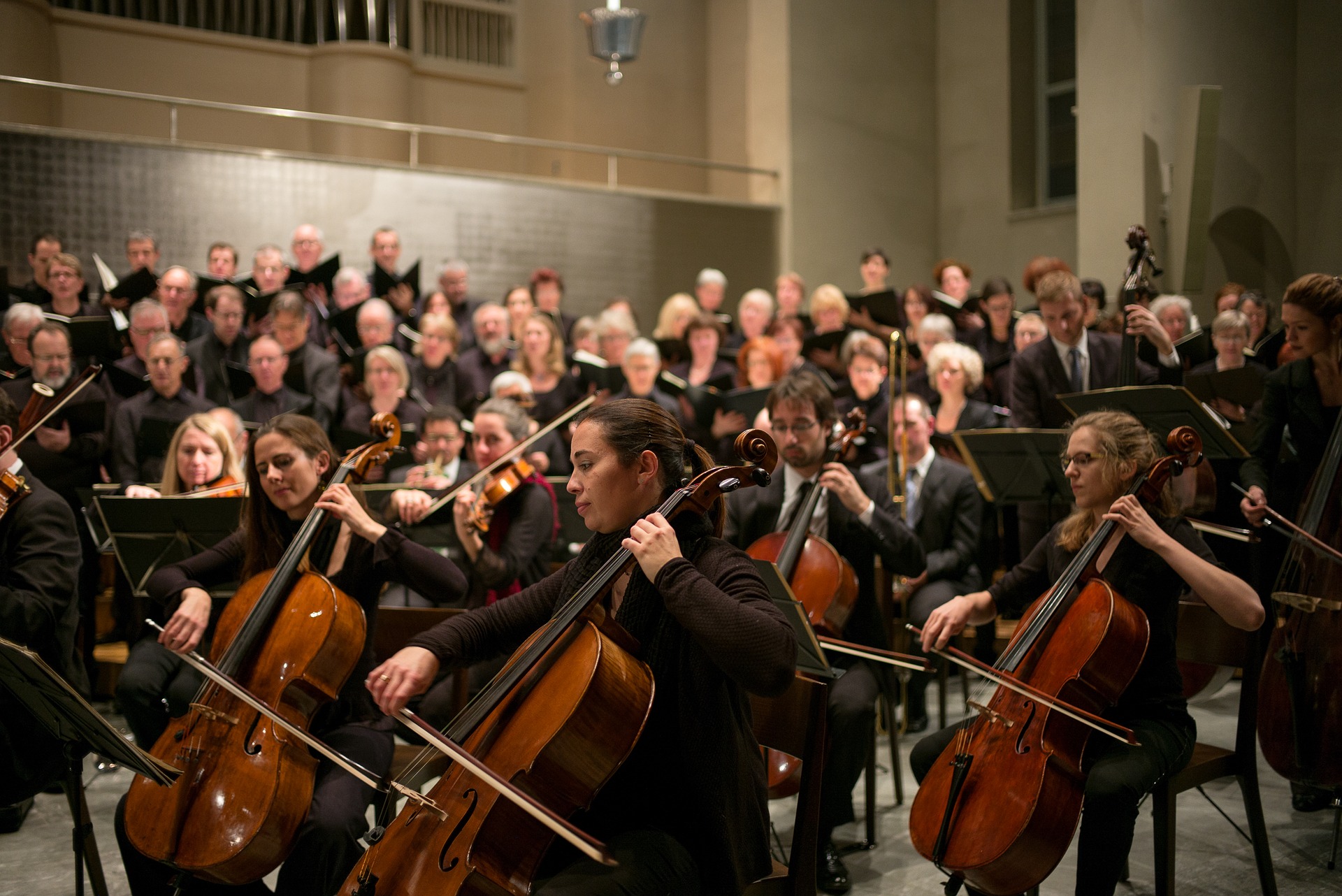Performance anxiety is an issue for numerous musicians, from beginner to veteran. With symptoms ranging from the shakes to a full blown disappearance of skill, once that ball is rolling how do you stop it? Classical Music Indy asked Dr. Miranda George, a trumpet player, vocalist, and teacher who has lectured and written about performance anxiety, to write a three part series on the topic. In Part 3 of the series, Dr. George provides guidance for teachers, conductors, and leaders of ensembles on the ways they can create an environment of performance confidence. You can find Part 1 of this series here and Part 2 here.
Antidotes for Performance Anxiety, Part 3: Environment
Teachers and conductors have a unique challenge when it comes to performance anxiety in the ensemble. This demands more than employing strategies or disarming techniques.1 Musicians are diverse in privilege (race, class, gender, ability), familial upbringing, and stories of struggle. With this diversity comes a smorgasbord of worthiness levels, from those who believe they are worthy of love and belonging to those who believe they are not. In order to combat the varying ways in which musicians may struggle with performance anxiety, be it from adrenaline, instability, or shame, ensemble leaders must cultivate an environment of performance confidence. Creating and maintaining an environment of trust helps cultivate a culture of courage, curiosity, creativity, and daring. This calls for bravery, as it requires a bit of personal inventory against an ever changing set of circumstances. Alas, courage begets courage.
Self-Care
There is a correlation between self-care (self-love) and performance confidence in musicians. Ensemble leaders cannot extend to their musicians what they do not extend to themselves. Many music teachers often try, running themselves ragged, prioritizing their job duties over taking care of themselves. Whether driven by shame, powerlessness, comparison, or a fear of uncertainty, this self-sacrificing hustle is a recipe for dysfunctional relationships, disappointment, and frustration. Good health and peace of mind are necessary for the presence required to cultivate confidence.2 This means prioritizing sleep, eating nutritious food, drinking water, exercising, hygiene, and relaxation. Another aspect of self-care involves taking care of one’s mental health by enlisting the help of a support group or a mental health professional if needed.
Self-Care Inventory: In what ways do I take good care of myself so that I may be fully present to my ensemble? In what ways may I improve? What is the current state of my mental health? Do I believe I am worthy of love and belonging? How may I prioritize self-care in order to cultivate a deep sense of worthiness? 3
Communication
Respectful language is key for building confidence in musicians. Ensemble leaders do not have any control over how others receive their words or non-verbal communication, so it is important that respect is employed as a rule, avoiding shaming language and excessive negative feedback. Demonstration of musicianship, positive commands (do this…), and constructive, nurturing criticism allow musicians to maintain a relaxed focus on the goal. Negative commands (don’t do that…) or over-identifying language regarding flaws or mistakes tend to derail the musician’s focus to that of the flaw itself, making the goal to avoid error or disapproval. 4 A few excellent resources for information on communication is The Inner Game of Tennis by Timothy Gallewey and Daring Greatly by Brené Brown.
It is inevitable that teachers and conductors will have days where they are low on patience with musicians. If possible, step away from the musicians for a moment to assess any feelings of anger or frustration with mindfulness and self-compassion.5 Repeated uncontrolled eruptions of negative emotion sabotage the safety of the performance environment, creating a fear-based setting, destroying trust, and damaging the self-worth of the musicians. Over time, this registers as trauma.6 Tyrannical ensemble leaders deny musicians access to the relaxed focus that allows for freedom of expression. Respect is imperative.
Communication Inventory: How do I communicate with my ensemble? Am I kind? When I am not necessarily kind, am I still being respectful? How often do I resort to negative commands, shame, or blame? How am I mindful of my feelings in my performance environment? Do I ever take out my own unresolved feelings of shame or pain on my ensemble? How often do I verbalize faith, gratitude, compassion, and empathy toward my musicians?
Trust
An environment of trust is necessary for connection, and connection is necessary in building confidence.
I define connection as the energy that exists between people when they feel seen, heard, and valued, when they can give and receive without judgement, and when they derive sustenance and strength from the relationship.” -Brené Brown in The Gifts of Imperfection
When feeling connected to a teacher or conductor in an environment of trust, not only are musicians more likely to exude confidence in their performances, there is a very special invitation for vulnerability which produces extraordinary, awe-inspiring musicianship.
In her book, Rising Strong, Brené Brown created a memorable acronym for building trust: “BRAVING”.
Boundaries – Draw healthy boundaries with work and with musicians. This includes refraining from choosing favorites in order to prevent unhealthy people-pleasing behavior in those who feel unfavored.
Reliability – Do what you say you are going to do. Follow through. Give musicians all of the time and resources they need in order to attain their musical goals.
Accountability – Take ownership of behavior, make amends when mistakes are made, and hold musicians to that same level of accountability.
Vault – Abstain from gossip and drama-driven situations, do not share what isn’t yours to share.
Integrity – Practice the values which are professed in the environment.
Non-judgment – Allow musicians to give and receive without judgement.
Generosity – Extend the most generous interpretation possible in response to the words, actions, and intentions of others.7
Trust Inventory: In what ways do I cultivate trust between me and my ensemble in regard to BRAVING? In what ways have I damaged trust? How do I make amends?
In the process of working through finding answers to these questions, ensemble leaders and teachers may find it helpful to congregate into support groups in order to listen, share ideas, offer help, and provide empathy for one another. In an environment of trust, musicians are more willing to take creative risks, discover themselves, and love themselves through triumphs and failures. This, I believe, is the greatest gift a music teacher or conductor may give.
1. [Disarming techniques (distraction) draws performers away from their preoccupation with themselves, allowing them to have access to their best musicianship. Examples of this include telling funny stories, rearranging or composing the music, asking the musicians to allow for mistakes, etc.]
2. [Amy Cuddy, Presence ]
3. [“There are no prerequisites for worthiness of love and belonging…You are worthy of love and belonging, as is. (Source: Brown, Brené. The Power of Vulnerability: Teachings on Authenticity, Connection, & Courage. 2012. [1] Headspace.)]
4. [Timothy Gallewey, The Inner Game of Tennis]
5. [Kristin Neff, Self Compassion; Take care not to blame the musicians for your impatience, as blame is no more than the discharging of pain and discomfort. (Source: Brown, Brené. The Power of Vulnerability: Teachings on Authenticity, Connection, & Courage. 2012. [1] Headspace.)]
6. [Brené Brown, Rising Strong]
7. [Ibid.]
 Dr. Miranda George is an active writer and lecturer on the topic of performance anxiety in musicians. She has received invitations to speak in public schools, universities, and in conferences such as the Texas Music Educators Association Convention and the Midwest Clinic. Dr. George recently finished her fifth year on the music faculty of the University of Texas at Arlington, and she is a private trumpet and voice teacher for Coppell Middle School East. To learn more about Dr. Miranda George and to read more of her writing, visit her Facebook Page here.
Dr. Miranda George is an active writer and lecturer on the topic of performance anxiety in musicians. She has received invitations to speak in public schools, universities, and in conferences such as the Texas Music Educators Association Convention and the Midwest Clinic. Dr. George recently finished her fifth year on the music faculty of the University of Texas at Arlington, and she is a private trumpet and voice teacher for Coppell Middle School East. To learn more about Dr. Miranda George and to read more of her writing, visit her Facebook Page here.








Leave a Reply